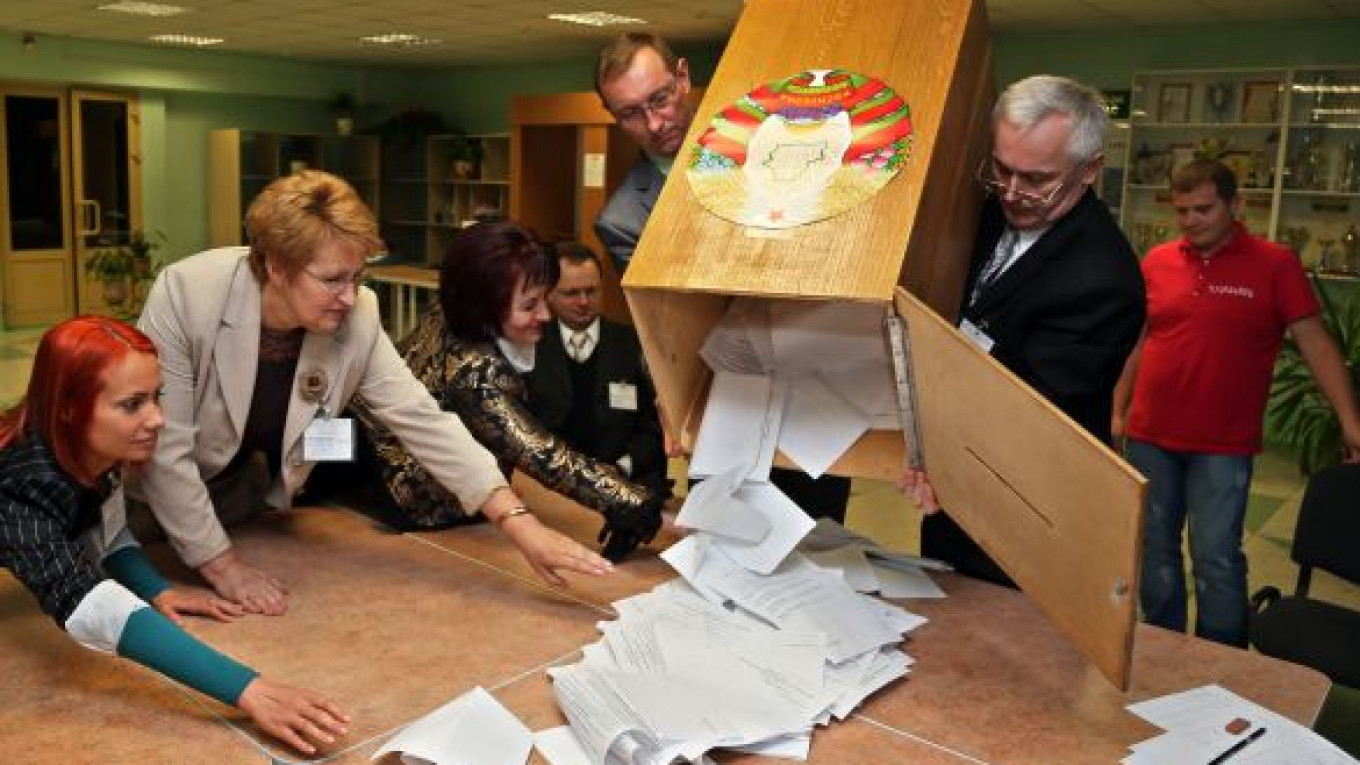A parliamentary election in Belarus boycotted by the main opposition was dominated by candidates loyal to President Alexander Lukashenko, reinforcing his autocratic 18-year-old rule, officials said Monday.
Electoral officials listed 109 winning candidates, all of whom represented pro-establishment parties. Moderate opposition figures who did take part failed to gain a foothold.
"It seems that candidates from the opposition parties do not enjoy the trust of their electorate," Nikolai Lazovik, a senior commission official, said at a news conference.
International election monitors gave a thumbs-down to the parliamentary election, saying it was neither free nor fair.
Monitors of the Organization for Security and Cooperation in Europe said many opposition politicians had been blocked from taking part in Sunday's poll and were unable to run campaigns.
"This election was not competitive from the start," Matteo Mecacci, an OSCE special coordinator, said in the statement. "A free election depends on people being free to speak, organize and run for office, and we didn't see that in this campaign."
The token parliament made up of loyalist deputies will reinforce Lukashenko, who has run Belarus since 1994. But the OSCE judgment was also certain to increase his international isolation and lock in place his poor ties with the West.
In a quick reaction, German government spokesman Steffen Seibert said: "It is very clear that President Lukashenko, instead of accepting the partnership with Europe that has been offered, continues on a course of repression, and this is a tragedy for his country, for the citizens of Belarus."
Lukashenko and his inner circle of officials are under travel bans and other sanctions from the United States and the European Union because of his heavy-handed rule.
His relations with the West nosedived when he cracked down on street protests against his re-election in December 2010. Scores of his opponents were arrested. Many now either lie low after periods in jail or have fled the country.
Western monitoring agencies have not judged an election in the country of 9.5 million free and fair since 1995.
Earlier, Belarussian election officials made it clear that none of the 109 newly elected deputies represented even those moderate opposition parties that had fielded candidates.
In protest of the detention of political prisoners and alleged irregularities, the two main opposition parties, the United Civic Party and the Belarussian People's Front, had called on people to go mushroom-picking or fishing rather than vote.
Human rights bodies say the run-up to Sunday's poll was marked by arrests and the detention of opposition activists.
Lukashenko, a populist described by the U.S. administration of George W. Bush as the last dictator of Europe, denounced the boycott, calling the opposition "cowards who have nothing to say to the people."
He had positioned himself for a negative verdict from the OSCE observer mission, saying: "If this time around there is doubt cast on the choice of the Belarussian people, then I don't know what standards will be good enough in future elections."
A report of preliminary findings published by the OSCE, which fielded 330 observers of the election, said many prominent politicians who might have played an important role in the election "remained in prison or were not eligible to register because of their criminal record."
"We were here in 2010 when some of those people were first arrested and put in jail, and we are sad that their voices could not be heard this campaign," Mecacci said.
The OSCE also said the opposition had been severely limited in its access to state-run media. In addition, there was a lack of proper ballot-counting procedures, and some observers were blocked from doing their job.
"Coverage of the campaign did not provide a wide range of views. Candidates who called for an election boycott had their free access to media coverage denied or censored. Media coverage focused on the president and government, with minimal attention given to candidates," the OSCE said in a statement.
"While early voting and election-day procedures were assessed positively, the process deteriorated considerably during the count," the statement continued. "A significant number of observers were not given a meaningful opportunity to observe the count and evaluated the process negatively in a significant number of the polling stations observed."
The election produced no new strong personalities to challenge Lukashenko's rule. Previous parliaments have initiated very little legislation independent of the presidency.
Despite U.S. and EU sanctions, which prevent Lukashenko and his inner circle from traveling anywhere in the West, the small country has weathered a currency crisis that drained it of dollars and caused two big devaluations.
Russia provided $4.5 billion in loans and investments in exchange for access to industrial assets such as pipelines pumping Russian gas to Europe.
With the deterioration in relations with the West, Belarus has moved closer to Russia, with which it has an open border and shares a common air defense network.
Related articles:
A Message from The Moscow Times:
Dear readers,
We are facing unprecedented challenges. Russia's Prosecutor General's Office has designated The Moscow Times as an "undesirable" organization, criminalizing our work and putting our staff at risk of prosecution. This follows our earlier unjust labeling as a "foreign agent."
These actions are direct attempts to silence independent journalism in Russia. The authorities claim our work "discredits the decisions of the Russian leadership." We see things differently: we strive to provide accurate, unbiased reporting on Russia.
We, the journalists of The Moscow Times, refuse to be silenced. But to continue our work, we need your help.
Your support, no matter how small, makes a world of difference. If you can, please support us monthly starting from just $2. It's quick to set up, and every contribution makes a significant impact.
By supporting The Moscow Times, you're defending open, independent journalism in the face of repression. Thank you for standing with us.
Remind me later.


